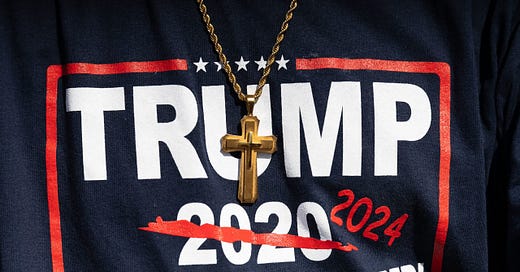
Last week Donald Trump told Olivia Nuzzi that he’d made his decision about running for president.
But there are laws which govern this process. They should probably even apply to a guy like Donald Trump.
In 1971, Congress passed the Federal Election Campaign Act, which requires federal candidates to register their campaign committees with the FEC and disclose campaign contributions and expenditures. While inadvertent violations of these requirements usually result in a civil enforcement action and a fine, knowing and willful violations of the Act can earn you up to five years in jail.
Once you decide to run for president (or any federal office) and raise or spend at least $5,000, you are required to file a statement of organization with the FEC. You can mess around on the margins and do some “testing the waters” without registering, but the minute you become a candidate, you have ten days to formally register your campaign committee.
Usually, these registration and reporting requirements are triggered by a candidate acting like a candidate—say, by running ads or holding a press conference announcing, “I am a candidate.” But while those are objective indications that the FEC can use to determine whether someone has crossed the threshold to become a candidate or is still “testing the waters,” that’s not the actual legal test.
While it doesn’t come up very often, the legal definition of a “candidate” is someone who (1) Has raised or spent at least $5,000; and (2) Has decided to run for federal office.
Whether the candidate publicly announces his decision is irrelevant.
One FEC advisory opinion puts it like this,
An individual who has raised or spent more than $5000 on “testing-the-waters” activities would become a candidate when he or she makes a private determination that he or she will run for federal office. . . . A non-conditional statement by an individual (directly or indirectly) that he or she “will” announce his or her candidacy on a given date unambiguously indicates that the individual has decided to become a candidate. . . . The fact that the public announcement postdates the individual’s statement of intent does not eradicate the registration and reporting requirements that have been triggered by the decision.” [Quotations and citations omitted.]
Here is what Trump told Nuzzi: “Well, in my own mind, I’ve already made that decision, so nothing factors in anymore. In my own mind, I’ve already made that decision. . . . Do I go before or after? That will be my big decision.”
So Trump has already decided whether or not he is a candidate. Which means that if he has decided to run, then he is required to file with the FEC within ten days of having made up his mind and he cannot legally spend or raise more than $5,000 on any campaign functions until he does. This limit on expenditures includes campaign staff and consultants.
If he does not file and continues to raise and spend money anyway, then he’s in willful and knowing violation of the campaign finance laws and subject to criminal prosecution.
Of course, none of this applies if Trump has decided not to be a candidate in 2024. In that case, he can continue raising and spending money through his leadership PAC with minimal restrictions.
What’s that you say? You think it possible that Trump has decided to run, but has gotten bad legal advice or is just ignoring legal advice altogether? Or that he’s counting on the attorney general to give him a pass on this violation, just as the AG has done for other obvious crimes Trump has committed in the past?
Anything’s possible, I suppose. But it’s hard to imagine a former president of the United States being so blatantly contemptuous of the rule of law or the Department of Justice letting him get away with it.
Right?



